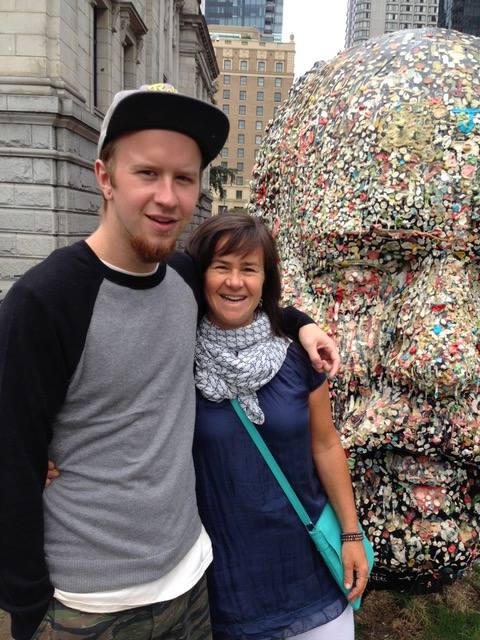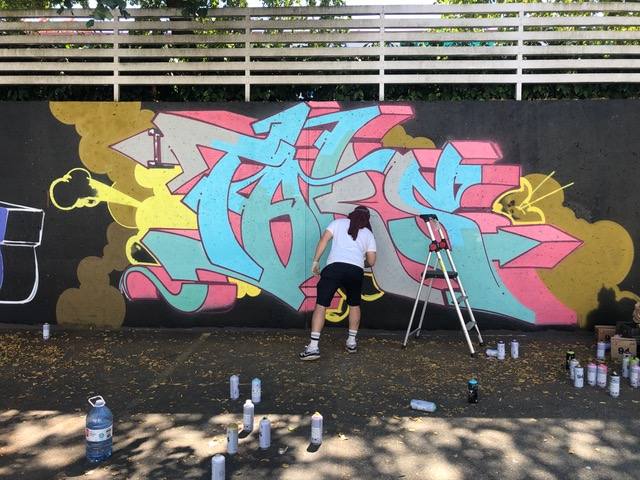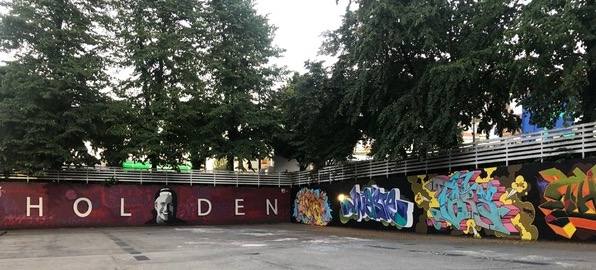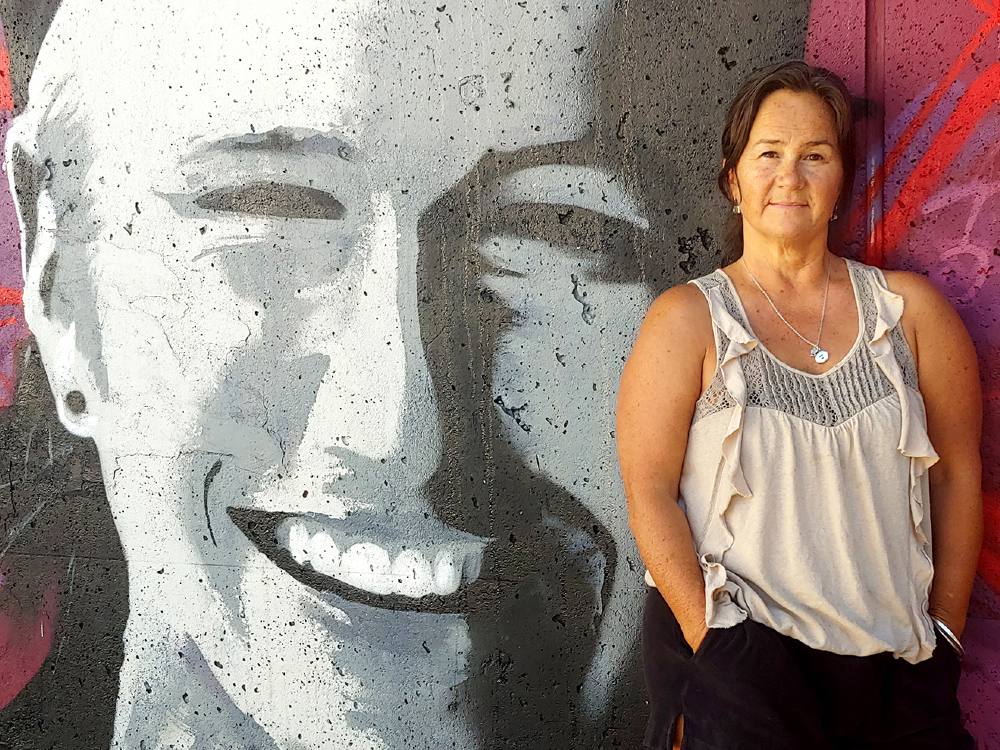- Holden After and Before
- Arsenal Pulp Press (2022)
The death of a child is an unbearable possibility. Even for a parent to entertain the idea prompts their imagination to shut down, like a circuit breaking during a power surge.
It’s remarkable then to see how Tara McGuire responded to the unthinkable loss of her son Holden with a wholehearted leap of the imagination. Holden died of a drug overdose at age 21 in a friend’s downtown apartment in 2015, a year before B.C.'s public health officer declared overdose deaths a public health emergency in April 2016. In her grief and her desire to understand her son’s death, she wrote Holden After and Before, a book that deals with her loss and the stigma of drug use through both non-fiction and fiction.
McGuire weaves her story of mourning and her subsequent quest to retrace Holden’s final days through conversations with his friends and lovers, his one-time therapist, a spiritual medium, and even the Vancouver Police Department between lengthy passages from Holden’s point of view. Through his mother’s recreations, we see his kindness to others and the issues with mental health that made him tough on himself, his love for graffiti art and consequent run-ins with the police. We also see his ultimately all-consuming addiction — one he was moving toward overcoming before his final night.
“The Jameson burns as it descends, its bitter taste stinging his tongue, rising into his nostrils,” McGuire writes in one passage from Holden’s perspective. “Every swallow warms Holden and takes him a little further away from the feeling of weighted dread he can’t explain. He gets lighter and lighter as the sky gets darker and darker.”
The combination of memoir and what McGuire calls “informed fiction” is seamless, a work of art that expands and challenges the category of “literary non-fiction” along the lines of Miriam Toews’ Swing Low or Alison Bechdel’s Fun Home.
“Why write at all? Why point a searchlight into the painful depths of my son’s darkest moments?” McGuire writes in the book’s afterword. “Because not talking perpetuates the suffering. More of the same silence that causes substance users to feel ashamed, judged and isolated will not protect anyone, change anything, nor prevent any more deaths.” McGuire considers her son’s death to be a result of unmet mental health needs that she portrays with compassion in the book.
McGuire is a former broadcaster and a recent MFA graduate from the University of British Columbia’s school of creative writing. (Full disclosure: Tara was my UBC student for a workshop in 2018, where I read an early version of one chapter in her book. I’m also thanked in the book’s acknowledgments page.) We spoke at a bakery in East Vancouver in August near the site of the Holden Courage Memorial, a mural dedicated to his memory. This conversation has been edited for clarity and brevity.
I’ve seen your writing about Holden for several years now. At some point you leapt into writing about Holden immersively. What made you decide to write from his point of view?
I actually started writing the book entirely from his point of view. And then I realized that wasn't complete, and that my perspective was an important part of the story. When I was writing, there was a lot of talk about appropriation. And I was very concerned ethically with writing, especially fiction or autofiction, whatever you want to call it, from Holden's perspective, because I wasn't there. Miriam Toews was a real inspiration in terms of writing, because she wrote about her father and his suicide from his perspective in Swing Low, and so that kind of gave me permission to do it.
I look at my book now as a continuation of our relationship. And I completely believe that Holden's okay with it.
What did you learn about Holden in your research that surprised you about him?
Obviously, I'm his mother, I love him, but when I was looking through his private messages, I realized how truly kind he was to other people and how helpful he was to other people and how openhearted he was.
He saved someone at Wreck Beach a week before he died, right?
Yes, he saved someone from drowning. But he very often just was present for people when they were struggling. He would listen to them and talk to them and send them songs and YouTube videos.
What has it been like learning about drug use in Vancouver?
It's been an education. I've learned that people use drugs for a lot of different reasons. And mostly it's just to feel better. And then sometimes maybe it's because they feel sick without them. But I think, initially, people use drugs because something is hurting them in some way. And that's what's not being addressed.
Now, when I see people who appear to be using substances or marginalized in some way, I try and take the time to talk to them, you know, because I think they're isolated, especially ones that are experiencing homelessness. I try to be respectful, and make eye contact and smile and just let them know that I see them as people. Because often they're invisible.

Death by overdose, a result of toxic drug supply, has become a disturbingly commonplace outcome. Have you connected with other parents who’ve experienced similar griefs? And what has that been like?
I've connected with quite a few people, just through private messages. For me, it was nice to know that people existed who had lost their children and they were still able to cope in society. Because for a long time, I didn't think I would. And now, it's been seven years since Holden died, which is hard to believe. But I hope that people who are experiencing the same losses now can see me and maybe realize, okay, given enough time, it is possible to survive this.
Holden was a street artist. Why do you think he was drawn toward that activity?
He started doing graffiti when he was in elementary school. He would trash garages in our neighborhood and fences and stuff. I think he really liked it because he was born in the '90s and was really into hip hop and rap music. And graffiti was a huge part of that. He was always just a super-artistic kid. And then I think there was this aspect of, I don't wanna say lawlessness, but it's pretty fucking cool to be a street artist, you know. And he was a really cool guy.
Later, he had some skill in that area. And he respected the people who could also do it. So he just couldn't stop. It was a compulsion for him, and that's what he would spend all this time doing. Lots of his friends are people I now consider to be my friends. They're all in their late 20s, early 30s. I stay in touch with quite a few of them, and they talk about him all the time. They send me pictures of their work and stuff. Some of them are getting married. And one of them just had a baby and her middle name is Holden.


You talk about your ethical boundaries in writing about your Holden as well as the friends of Holden and family members who could read it. Did you set any ethical guidelines about what you could or couldn’t do?
I made sure that when I was writing about Holden, I had some form of evidence or jumping off place, whether it was a photograph, or text message, or something. I interviewed with a lot of his friends. I went to a lot of places I wrote about in the book, so I made sure there was something real and tangible to start with. I expanded into fiction from there. I've also made it a point to always write from a place of love, and not one critical of anyone. I don't necessarily think that negative characteristics or negative actions mean a person is a bad person. I had to take some people out who didn't want to be in the book. Holden's friends are disguised or composite characters. Locations are changed. Anybody who’s in the book knows they’re in it. I asked them all permission. And they were super generous.
Some people are not going to be happy with it. That's okay, too. It's okay to be unhappy.
I found I was most impressed by how you use age-appropriate slang in Holden’s voice. That would terrify me to attempt as a writer.
A lot of those lines are legit, from text messages. That's Holden talking, not me. But I'm glad I got his voice because you can tell when someone's trying to fake it and it doesn't quite come across.
The saddest part of this book is the sense that Holden almost turned it around before he died. Is the idea of addiction and recovery as linear something you’re fighting in Holden After and Before?
Absolutely. I used to be really rigid in my beliefs. But then I realized that most illnesses are not linear. Cancer comes back, all kinds of illnesses come back. We treat them in different ways and with different approaches, and there are always influences and impacts. Our lives are swerving all the time.
What I've learned about recovery and substance use disorders is how important the language is. I wouldn't even refer to Holden as an addict anymore. I would say that he struggled with substance use disorder, and that he had mental health difficulties that he could have used more help with. And that's how I try to look at everyone now. People relapse. I mean, I relapse with food and Netflix and whatever — that's gonna kill me slowly.
I am way more patient, and I have way more bandwidth for whatever people are trying to do, in the moment, just to get through the day.
Come back tomorrow to read an excerpt from Tara McGuire’s 'Holden After and Before.' ![]()
Read more: Health, Rights + Justice
















Tyee Commenting Guidelines
Comments that violate guidelines risk being deleted, and violations may result in a temporary or permanent user ban. Maintain the spirit of good conversation to stay in the discussion.
*Please note The Tyee is not a forum for spreading misinformation about COVID-19, denying its existence or minimizing its risk to public health.
Do:
Do not: